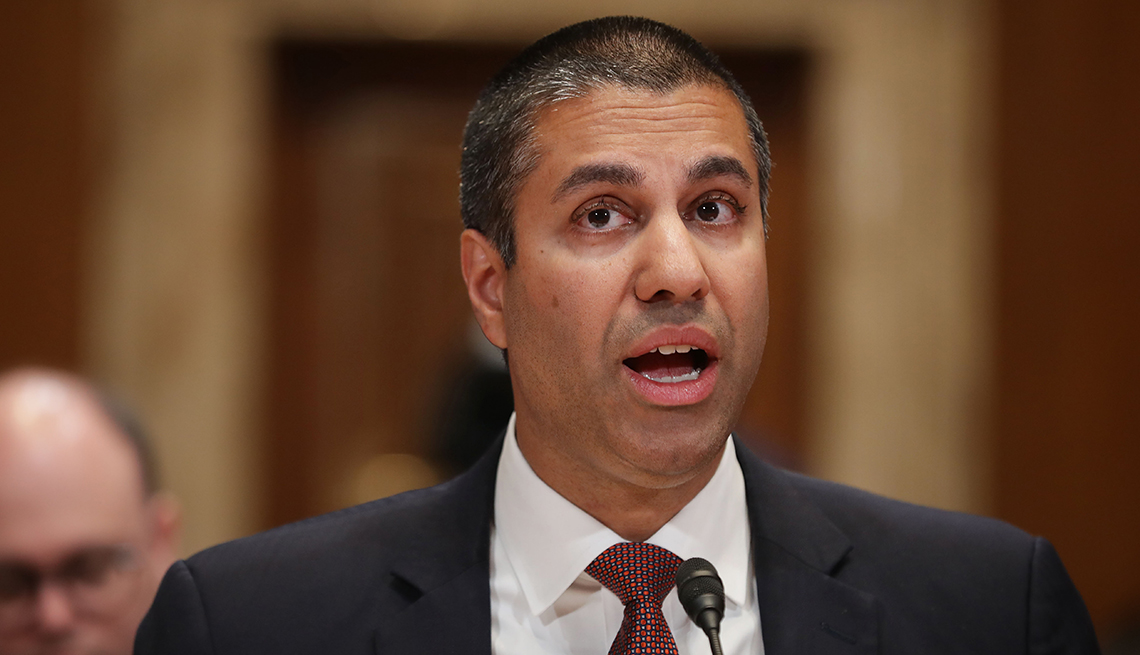
Ajit pai's policing the internet as ftc chariman
- Select a language for the TTS:
- UK English Female
- UK English Male
- US English Female
- US English Male
- Australian Female
- Australian Male
- Language selected: (auto detect) - EN
Play all audios:

RESPONSIBILITIES: Enforces the nation's communications laws and regulations, with a recent focus on the internet. The FCC regulates radio, television, wire, satellite and cable
communication. As chairman of the independent agency, Pai oversees a budget of $339 million and an organization with 1,450 employees. CURRENT PRIORITIES: The FCC has recently been pushing
the telecom industry to work harder to block scam robocalls. The commission will vote this year on requiring that wireless 911 calls give first responders information about what floor the
caller is on in multistory buildings. Under Pai, the FCC has also vowed to make sure broadband access to the internet is more widely available. AT A GLANCE AGE: 46 HOMETOWN: Born in Buffalo,
N.Y., and raised in Parsons, Kan. He lives in Arlington, Va. TIME IN OFFICE: President Trump designated him FCC chairman in January 2017 PERSONAL: He is married with a son and daughter. His
parents, both doctors, were immigrants from India BACKGROUND: A former partner in a law firm, he also worked as associate general counsel at Verizon. He served as chief counsel to a Senate
subcommittee. Pai is a major player in the battle over internet regulation as a leader in repealing “net neutrality,” the principle that internet providers should treat all online
communications equally and so not discriminate or charge differently based on the user or their usage. WHAT HE SAYS ON THE INTERNET: “The [i]nternet is the greatest free-market innovation in
history. It's allowed us to live, play, work, learn and speak in ways that were inconceivable a generation ago. But it didn't have to be that way. Its success is due in part to
regulatory restraint. Democrats and Republicans decided in the 1990s that this new digital world wouldn't be centrally planned like a slow-moving utility." ON THE FUTURE OF
BROADCASTING: “The history of wireless innovation is one of government creating space for broad thinking and entrepreneurs using that space to take us in unexpected directions,” he said in
proposing a new experimental broadcast license. “With this order, we'll set up a big sandbox for engineers and technologists to work with — and we'll then see what American
ingenuity delivers." ON STOPPING ROBOCALLS: “American consumers are sick and tired of unwanted robocalls, this consumer among them. Caller ID authentication will be a significant step
towards ending the scourge of spoofed robocalls,” Pai said in a recent statement. “This goal should be achievable for every major wireless provider, interconnected VoIP operator, and
telephone company — and I expect those lagging behind to make every effort to catch up." WHAT PEOPLE ARE SAYING “He has an energy and an earnestness you don't see a lot in
regulatory policy,” says James Gattuso, senior fellow at the Heritage Foundation. “He's been demonized by so many groups on net neutrality, it's hard for people to see how
innovative he's been and how effective." “If you agree with him, he's done great. If you believe the internet should be open and free and ISPs shouldn't be in control of
every aspect of the internet, he's been kind of a nightmare,” says Katharine Trendacosta, policy analyst with the Electronic Frontier Foundation, a San Francisco nonprofit digital civil
liberties organization. THEY WORK FOR YOU ROBERT WILKIE, 56 SECRETARY, DEPARTMENT OF VETERANS AFFAIRS (VA)
